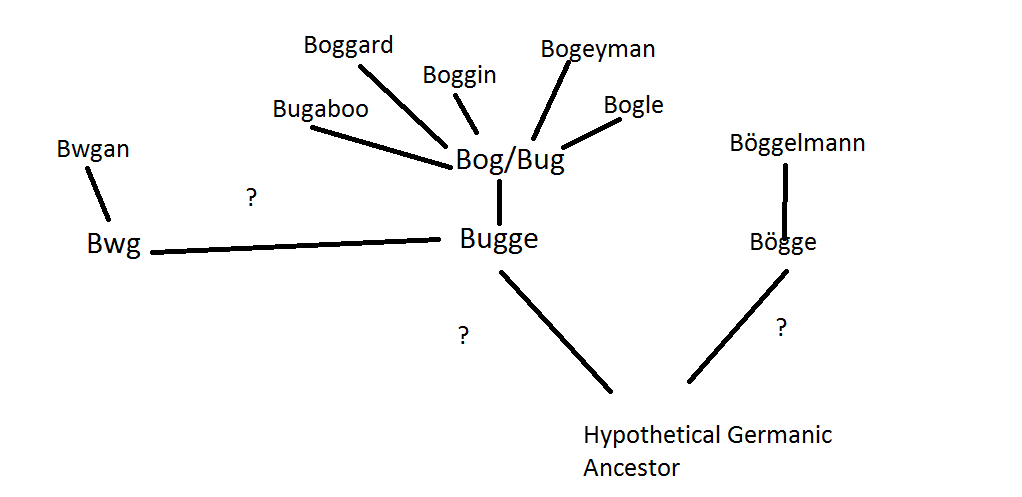A Linguistic Family Tree of North-West European Fairies January 4, 2016
Author: Beach Combing | in : Medieval, Modern , trackbackWord history is particularly fraught where supernatural creatures are involved. Uncanny things multiply with such disconcerting speed (often varying from valley to valley) that the normal philological approaches can easily get stuck in the mud. A particularly painful example of this is what might be called the bugge family. Bugge meant demon or spirit in Middle English: it is the word that eventually evolves into boggart and bogeyman. But where does it come from? Philologists have traditionally (as is their wont) looked west towards the Celtic languages and Welsh, in fact, has bwg meaning demon or spirit so that worked quite well. However, if you look east there is also a German dialect word (with many and extremely complicated reflexes), bögge that means the same thing. These three words have all evolved into other forms, so the English bugge became bug or bog that became, say, the Cheshire monster, the boggin; the Welsh word became, meanwhile, bwgan (did the Cheshirites make a difficult situation worse by borrowing a Welsh word?!). But which, if any, of the three languages has priority? The English bugge seems to be the earliest attested: it appears, for example, in Chaucer. Welsh bwg only appears in the later sixteenth century: of course, it could have escaped writing for several centuries… Perhaps the most economical explanation is that German and English (two Germanic languages) had bogge (or some such) in their common ancestor language: and that the Welsh borrowed the word at the end of the Middle Ages. It is also possible, of course, that there was a common ancestor in Indo-European, though its absence from much of the rest of the IE continuum is embarrassing… However, there is another problem which is perhaps the most perplexing of all. In north-west European languages there are a series of other forms that look as if they are related to each other, and that could, at a glance, be cousins of the bogge forms. In Norse there is púki, (a devil), in English there is Puck (of Midsummer Night Dream fame which comes from Anglo-Saxon puca), in Irish there is púca; in Anglo-Irish pooka and phooka and bocan and bocanách; in Manx there is buggane. Can these terms all be related to a hypothetical Anglo-Saxon word bugge*: it is possible. If it were the case then half of British and Irish faery are actually second cousins. Any thoughts on the bugge mystery: drbeachcombing At yahoo DOT com
PS in writing this Beach referred extensively to an excellent article Cooper, Brian ‘Lexical reflections inspired by Slavonic *bog: English bogey from a Slavonic root?’, Transactions of the Philological Society 103 (2005), 73 – 97. If Brian ever reads this, I’d love to get in touch.



